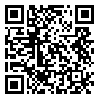buin zahra university
Abstract: (727 Views)
Abstract
Background and Objective: The present study aimed to investigate the effectiveness of a parent-child interaction enhancement program on the psychological indicators of mothers of children diagnosed with Attention-Deficit/Hyperactivity Disorder (ADHD).Methods: The statistical population consisted of all mothers of children with ADHD who had been referred to the Fanous-e-Kherad Counseling Center in Karaj, Iran, and had received a confirmed diagnosis of ADHD by a psychological assessment team, as documented in their case files. Using a quasi-experimental design, a sample of 30 mothers was selected from an initial pool of 50 eligible participants. Data collection instruments included the Emotion Regulation Questionnaire (Garnefski et al., 2001) and the UCLA Loneliness Scale (Russell, Peplau, & Cutrona, 1980). Multivariate analysis of covariance (MANCOVA) was employed to compare mean scores between the experimental and control groups.
Results: Findings indicated that the parent-child interaction training significantly improved emotion regulation among mothers of children with ADHD (F = 8.37, p < 0.05). Furthermore, the training was effective in reducing social isolation among these mothers (F = 9.16, p < 0.05).
Conclusion: The results suggest that enhancing parent-child interaction has a significant impact on improving psychological indicators—namely, emotion regulation, feelings of loneliness, and social isolation—in mothers of children with ADHD. Notably, the greatest effect was observed in reducing maternal feelings of loneliness compared to improvements in emotion regulation and social isolation.
Keywords: Keywords Parent-child interaction, Psychological indicators, Attention-Deficit/Hyperactivity Disorder
Type of Study: Original Research Article |
Subject:
Psychology
Send email to the article author
| Rights and permissions | |
 |
This work is licensed under a Creative Commons Attribution-NonCommercial 4.0 International License. |


